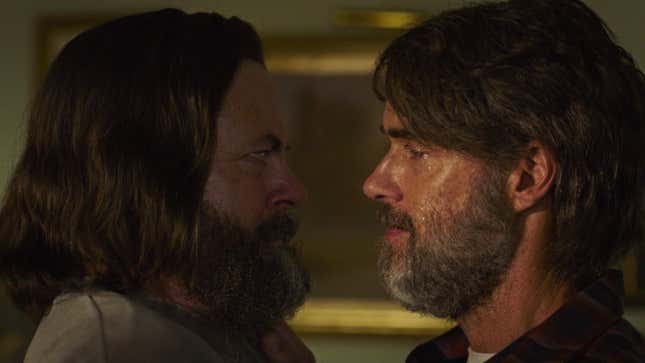
“Paying attention to things—it’s how we show love!”
—Frank
First of all, if you’re reading these recaps in real time, you may note that this one is a few days late. Sorry, I got pinned down by clickers in the surprisingly mountainous terrain 10 miles west of Boston. Ah well, it only gave me more time to mull over this terrific episode of television.
The third episode of The Last of Us is also its second-longest behind the premiere, coming in at an hour and 15 minutes, which means we’ve got a lot of ground to cover. It’s also, notably, the first episode that goes right into the opening credits, without a cold open prologue to kick things off. (You can find my recaps of those first two episodes here and here.)
This is, in my opinion, the best and boldest episode of the series, one that actually adapts the source material in exciting ways to play to the freedom afforded by television. In an action game, it would be strange to take a detour for a long chunk of time to watch a story about a non-playable character who isn’t central to the main thrust of the narrative. Here in HBO’s show, however, we can find entirely new dimensions to characters who were only peripheral to the game’s narrative, dimensions that, rather than being frivolous and unnecessary, meaningfully alter the entire thematic arc of the show. With this episode, we get a picture of a post-apocalypse where love and connection, while still exceedingly rare, do spring up in the most unlikely of places, allowing people to still carve out lives suffused with meaning, tenderness, and love. It’s a welcome reprieve from the devastating brutality of what came before, and of what’s yet to come.
But I’m getting ahead of myself. You may recall that, at the end of episode one, “Never Let Me Down Again” by Depeche Mode began playing on Joel’s radio, seemingly a message of trouble from Bill and Frank. What could be waiting for our duo in this little house some ways outside of Boston?
A makeshift memorial for Tess
With his knuckles still raw from the bludgeoning he dealt to the FEDRA officer not long ago, Joel stacks rocks into a cairn, most likely his way of trying to give Tess’ death some kind of tangible acknowledgment. It’s a symbol, perhaps, of how fragile and ephemeral all connection is in the brutal world they live in, setting the stage for what’s to come and reminding us just how rare and remarkable what Bill and Frank have is.
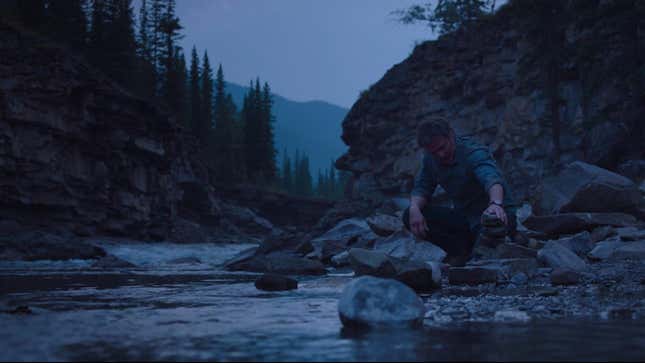
Things are tense back at camp. Joel’s always quiet but now he’s surrounded by a grieving, angry force field of quiet. You can actually feel the awful silence radiating from him. Ellie dares to break it anyway, and rather than apologizing for Tess’ death, she asserts herself, saying that nobody made Joel and Tess take her, “so don’t blame me for something that isn’t my fault.” I thought for sure Joel was going to explode at her for that, but instead, after a moment, he nods, perhaps respecting her for speaking up for herself. A small but significant turning point in their relationship.
As they hike toward Bill and Frank’s, we finally get to see spaces that are truly overrun with green, reflecting the natural beauty of so much of the game’s world. Joel may still not seem up for much conversation but that doesn’t stop Ellie from peppering him with questions, giving us our first insight into a bit of backstory for Joel that was created just for the show. When Ellie inquires about the scar on his forehead, Joel replies, “Someone shot at me and missed.” “See, that’s cool,” Ellie says, before hitting him with more questions that he seems reluctant to answer. It could be a throwaway conversation, or it could be a story with more to it that Joel just isn’t sharing yet. In either case, it shows Ellie making a real effort to connect with Joel, and continuing to be fascinated with his propensity for violence.
Ellie the gamer
Joel leads them into what remains of an old Cumberland Farms to retrieve some things he’s stashed, but Ellie’s attention is grabbed by something in the back corner: a dusty old Mortal Kombat II cabinet. “I had a friend who knew everything about this game,” Ellie says, suggesting that a famous moment from the amazing story expansion The Last of Us: Left Behind that incorporated the fictional arcade game The Turning just might use this real one in the show. “There’s this one character named Mileena who takes off her mask and she has monster teeth and then she swallows you whole and barfs out your bones!” Ellie sighs wistfully, the poor thwarted gamer born too late. (In this stretch of the game, she has a similar encounter with The Turning.)
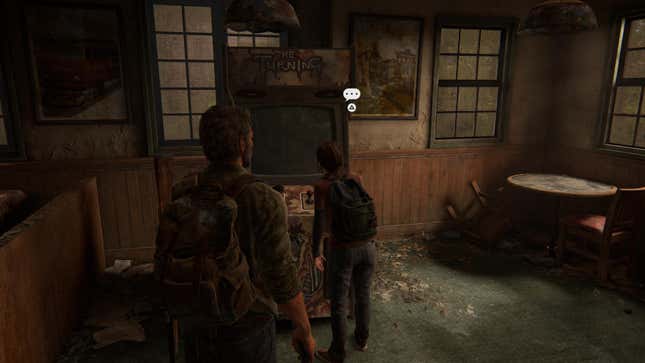
Before venturing into other parts of the store to scrounge around, she asks Joel, “Is there anything bad in here?” “Just you,” he says, trotting out the same joke he’d already used with her once before and proving that he’s not completely humorless, just mostly that way. “Ah, getting funnier,” she says.
Joel turns out to be wrong, though, and as she rummages in the basement, Ellie finds a box of tampons and, trapped under a collapsed wall, an infected who’s been there for god knows how long. She pulls out her switchblade and holds it in front of the imprisoned figure, its eyes watching the blade with something like intelligence. I thought back to Joel and Ellie’s conversation in the previous episode about how infected were once human, and wondered if some remnant of the human it once was hoped Ellie would kill it and put it out of its misery. She does, perhaps because she feels like it’s the right thing to do, but I suspect more to test her own capacity for violence.
As they continue their hike, they walk past a hill with the old wreckage of a passenger jet on it, the first image that was ever released from production of the series. It’s a striking image for sure, one that gives Ellie the chance to remark on how lucky Joel was to have flown in one of those things. “Didn’t feel like it at the time,” he says. “Get shoved into a middle seat, pay 12 bucks for a sandwich.” With understandable envy and awe, Ellie retorts, “Dude, you got to go up in the sky!” Rapidly, things between Ellie and Joel are starting to feel a bit less guarded and a bit more conversational.
Pancakes of death
Next, she asks him about outbreak day, puzzled by how everything could have collapsed so rapidly. When he wonders how she didn’t learn this in school, she says that her FEDRA school didn’t teach “how their shitty government failed to prevent a pandemic,” words that echo with a strange significance here in our own version of 2023. So Joel answers, finally shedding some light on what the dominant understanding is in the show’s world for just how the outbreak originated.
The best guess, he says, is that cordyceps mutated and got into the food supply, “probably a basic ingredient like flour or sugar. There were certain brands of food that were sold everywhere, all across the country, across the world. Bread. Cereal. Pancake mix,” he says, reminding us of that moment in episode one when Sarah wanted to make pancakes. When I first realized that Joel dodged several bullets that day by not eating pancakes, or the biscuits the neighbors were eating, or any other baked goods, it was a bit like a great M. Night Shyamalan twist, where suddenly little moments I didn’t pay much attention to at the time took on new significance.
People all over the world ate things made with contaminated ingredients, he says, and started getting sick and eventually biting others, spreading the infection further. “Friday night, September 26, 2003. And by Monday, everything was gone.” I don’t know enough about the global distribution of foods like bread and cereal to say if it makes sense that contaminated items could hit shelves in spots all over the world at roughly the same time. It seems iffy, but then, the plausibility of the outbreak hardly matters to me. It’s just a thing that has to happen to set the story in motion.
It’s the end of the world as we know it...
Joel tells Ellie he wants to cut through the woods because there’s “stuff up there you shouldn’t see.” This, of course, only makes Ellie curious, and she walks on ahead, over Joel’s objections. What she finds is a haunting sight: the bones of a few dozen people, suitcases and other items amidst the carnage, people who were obviously executed in a large group. Joel sheds more light on the aftermath of society’s collapse. “About a week after Outbreak Day, soldiers went through the countryside, evacuated the small towns, told you you were going to a QZ and you were…if there was room.” What, Ellie wonders aloud, was the point of killing them? “Dead people can’t be infected.”
Then comes a particularly painful flashback leap. The camera focuses on two sets of bones, one of the skulls noticeably much smaller, with rainbow-patterned fabric underneath it. Suddenly we leap back 20 years, to 2003, when this baby and its mother were very much alive, the mother smiling at her child as other people wait in the back of a truck and soldiers spray paint red Xs on the doors of nearby homes.
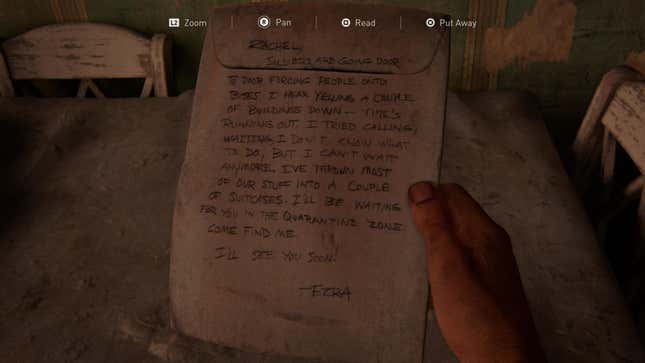
Incidentally, this image of FEDRA soldiers rounding people up and carting them off to the QZ is not entirely absent in the game. It’s evoked by the letter above, which you can find while exploring in the abandoned town that surrounds Bill’s compound. “Soldiers are going door to door forcing people onto buses,” it says in part. You also see a sign announcing the mandatory evacuation in the game that’s very similar to one in the show.
One home the soldiers enter has a number of surveillance cameras affixed to it, and inside, a shadowy figure, silently lurking in the basement, stares at a bank of monitors. As the footsteps of FEDRA officers are heard above, the man grabs a rifle—they’re not taking him without a fight.
But soon, the soldiers move on, and the man says “Not today, you new world order jackboot fucks.” This is Bill, and what a glorious introduction to him it is. Nick Offerman’s delivery of the line is perfect, somehow both hilarious and entirely serious, and as we see the woman and her child get hauled off in the truck along with other civilians to their tragic fate, we know Bill is right not to cooperate.
...and I feel fine
We also quickly learn that Bill has been preparing for a situation like this for a long time. His bunker, cleverly hidden beneath an ordinary-looking chest of drawers, is full of rifles and handguns, bullets and sulfuric acid. When he emerges, mask on and gun at the ready, he does a sweep of his house to make sure it’s really empty, then heads outside into what is now a town with a population of one. Oh, happy day! You can instantly feel that this is just the sort of situation Bill’s been hoping for his whole life. Time to hop in the pickup truck, blast some tunes, and head to the Home Depot, baby! Daddy’s got some stockin’ up to do!
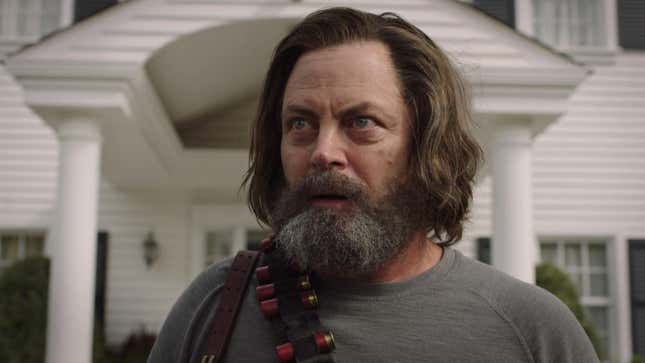
During this whole rollicking sequence, in which Bill stocks up not just on necessities and supplies but also luxuries like fine wine (all while “I’m Coming Home to Stay” by Fleetwood Mac plays), it’s easy to think that, for Bill, the end of the world could be paradise. He grows chickens and vegetables, cooks fresh meat, and makes himself the most delicious-looking meals, all without ever having to deal with other people.
And he’s even got entertainment! As he’s enjoying his dinner one day, an alarm buzzes. He turns on a TV to see an infected, shambling twitchily toward his home. “Keep comin’,” he says. The former human walks right into a tripwire, setting off a firearm that blasts it right in the head. “Ho!” Bill says with delight at his own ingenuity. “It doesn’t get old.” In the game, the image of an infected triggering one of Bill’s traps is also used, but there it serves to alert you to the dangers you face as you trespass into Bill’s neighborhood. Here, it’s a man taking pleasure in his own handiwork.
Arby’s was a restaurant
For four years, Bill’s life continues like this, with him venturing out beyond the compound for supplies and welding new traps in his bunker. Then another one of his alarms buzzes, and everything changes.
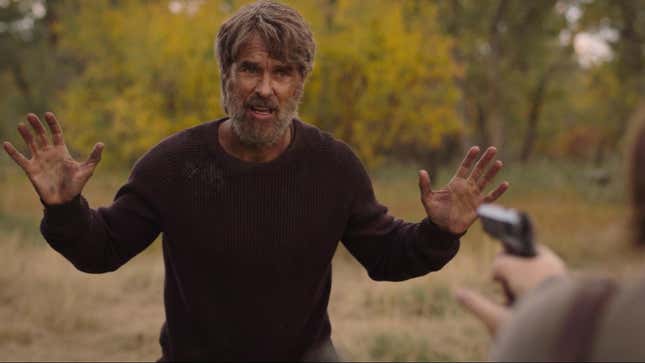
It’s not an infected he’s caught this time, but a man (Murray Bartlett, The White Lotus) who fell into one of Bill’s pits while heading to Boston from Baltimore, where the QZ “is gone,” he says. Bill is characteristically cautious, holding him at gunpoint and saying “Boston is that way,” trying to send him along and bring their association to a swift end. “I’m really hungry,” the man pleads, before trying to humanize himself in Bill’s eyes by saying “My name’s Frank.” It leads to one of the funnier and more memorable exchanges in the series. “If I feed you,” Bill says, “then every bum you talk to about it is gonna show up here lookin’ for a free lunch, and this is not an Arby’s.” Frank, still holding his arms up, looks confused. “Arby’s didn’t have free lunch, it was a restaurant.” Now come on, how can you not wanna keep this guy around?
Frank promises not to talk about it to any “bums or hobos or vagabonds,” and suddenly Bill has his first guest in at least four years, possibly a lot longer than that.
The first dinner
Bill proves himself to be a surprisingly thoughtful (if awkward) host, not just letting Frank take a shower but giving him new clothes as well. It’s almost as if he’s been waiting for the chance to be nurturing and to care for someone for a long time. And for the meal itself, Bill’s pulled out all the stops. The plate of meat and vegetables he presents to Frank, rotating to just the right angle as he serves it, is gorgeous, and as Frank grabs the silverware and drapes the napkin across his lap, you can tell he hasn’t had a meal like this in a very long time. (Bill may be the only person on the planet who’s still eating this well post-apocalypse.) Frank’s reaction to the existence of such a meal after he takes the first bite is perfect: “What the fuck?!”
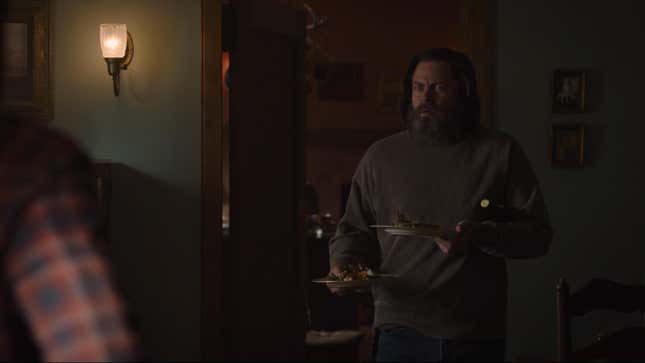
Frank also praises Bill for knowing just the right wine to pair with the meal. “I know I don’t seem like the type,” Bill says. “No, you do,” Frank says, and the way Offerman plays Bill’s reaction to this, it’s as if he’s starting to see himself in a new way through Frank’s eyes. That can be a transformative experience, and it certainly proves to be for Bill.
The meal finished, Frank says he’ll be on his way, but he just has to check out the antique piano in the living room first. Rummaging through the available sheet music, he finds a collection of Linda Ronstadt tunes, and tears into a rough but rollicking rendition of “Long, Long Time.” It’s certainly lacking in technical proficiency, but it has an endearing earnestness to it. Bill, however, does not enjoy it, closing the booklet of sheet music and stammering his “no thank you”s and his “not this song”s. Frank seizes the opportunity to throw down a challenge, gesturing toward the bench with a “well, let’s see you do it, then” attitude.
And boy, does Bill ever do it. His understated performance cuts right to the vulnerable heart of the song, and the words of loneliness and yearning take on larger meaning, given that we know just how profoundly solitary Bill’s life has been for so long:
…but there’s no one at my side
And time washes clean
Love’s wounds unseen
That’s what someone told me
But I don’t know what it means
‘Cause I’ve done everything I know
To try and make you mine
And I think I’m gonna love you for a long, long time
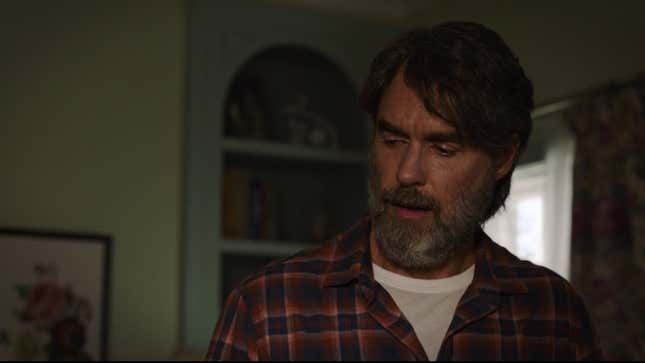
Blown away by the emotional power of Bill’s performance and knowing there must be a tremendous depth of feeling behind it, Frank asks, half-joking, “So, who’s the girl?” It’s a lovely moment from Murray Bartlett, as we see him process his own swelling of emotion in response to what he’s just heard. But we know, and Frank knows, that there is no girl. Soon the two share a kiss, probably the most passionate kiss Frank has had in years, and maybe the most passionate kiss Bill has ever had. I keep thinking about the single tear that rolls down Frank’s face in this scene, like the first drop of water when a dam breaks. I doubt he thought love would ever be a real possibility in his life again, but sometimes everything really does change in a flash.
Read More: HBO’s The Last Of Us Reclaims The Queerness Its World Forgot
In the bedroom a short while later comes the heartbreaking but unsurprising revelation that Bill’s only previous sexual experience was “with a girl, a long time ago.” The thought of him as a gay man who found no outlet for his identity in a homophobic society makes it easier for me to understand how he came to be so reclusive and resentful of society in the first place. Rather than being awkward about Bill’s lack of experience, Frank compassionately promises to “start with the simple things,” but also says he’s not the type to have sex for lunches, “even great ones,” so if he does this, he’s staying for at least a few more days.
“The government are all Nazis!”
A few days turns into a few years, and naturally not all the days are good ones, as we jump ahead to Frank storming out the door in anger. All Frank wants is to beautify the neighborhood they live in, and as he lashes out at Bill, he sheds some light on his partner’s politics. “You live in a psycho bunker where 9/11 was an inside job, and the government are all Nazis.” “The government ARE ALL NAZIS!” Bill retorts, to which Frank replies, “Well, yeah, now, but not then!”
The longer the series goes on, the more sense it makes to me that the writers opted to shift Outbreak Day to 2003. One admittedly minor but not insignificant detail that occurs to me here is that, if it had taken place in 2013, some could have seen Bill’s prepper mentality and Don’t Tread On Me flag as a potential response to the presence of a Black man in the White House, since, after all, there was a significant increase of doomsday preppers in the U.S. during the Obama administration.
Bill soon relents, after Frank persuasively argues that he wants to take care of the neighborhood because “paying attention to things” is how we show love, but a moment later, Bill’s isolationist alarm bells are set off again as Frank insists that the pair is going to have friends. “I’ve actually been talking to a nice woman on the radio,” Frank says.
Dinner with friends
Soon, much to Bill’s frustration, the two are having a lovely meal, with guests, in the front yard. The guests are none other than Joel and Tess, somewhat younger and perhaps less guarded and cynical than when we last saw them together, less beaten down by the relentless misery of the world. Tess in particular seems different, lively and hopeful as she speaks about the possibility of working with Bill and Frank before excitedly following Frank indoors for a tour of the house, leaving the two more gruff members of the party to have a little gruff man chat.
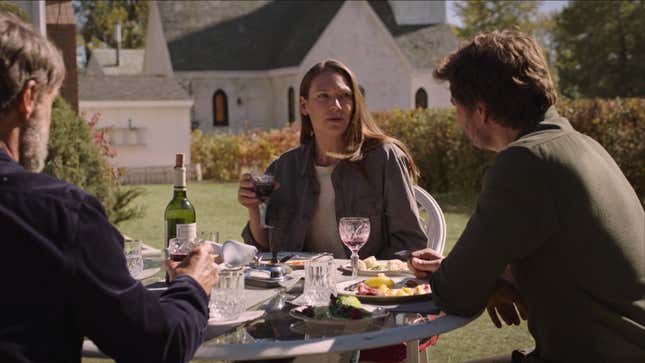
Joel pitches the idea that, with their QZ connections, he and Tess can get Bill and Frank things they otherwise couldn’t. But Bill still doesn’t want anything to do with anyone besides Frank. “I don’t need you or your friend complicating our lives,” he says. Joel keeps trying to appeal to Bill’s desire for safety, playing up the threat of raiders who, sooner or later, will come in the night, armed and deadly. “We’ll be fine,” Bill says, but meanwhile, nearby, Frank—who doesn’t share Bill’s unhealthy desire to be cut off from others—is speaking to Tess about trading, and hammering out the details of the musical code we learned about in episode one.
“Older means we’re still here”
Frank gets his way when it comes to working with Joel and Tess, as we learn after another three-year time jump that takes us to one of the most tender and meaningful scenes in the episode. After a jog around the neighborhood that leaves Bill winded, Frank shows him a surprise: a small plot of strawberries he’s grown after trading one of Bill’s guns to their friends in the QZ for a pack of seeds. Once Bill might have been furious about this, but he seems to have mellowed on the topic, and as he bites into a strawberry, he makes a sound that’s somewhere between laughing and crying. It’s beautiful.
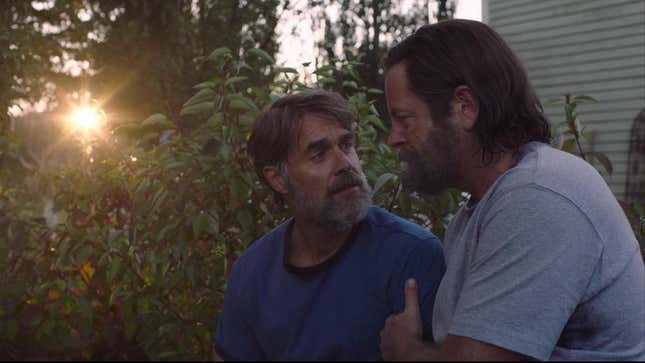
The strawberries themselves are precious, and so too is this moment between the two of them on this sun-dappled afternoon. Still winded, Bill apologizes for “getting older faster than you.” Frank, with his typical warmth and wisdom, says “I like you older. Older means we’re still here.” The significance of these two gay men enduring together after the apocalypse has already been explored in this piece by Kenneth Shepard, so I’ll direct you to that for more on just what makes this image and this moment so significant.
“I was never afraid before you showed up,” Bill says, and this cuts to what’s arguably the core idea of The Last of Us: the notion that, just maybe, life is better when you have someone to worry about.
Sadly, Joel’s warning about raiders eventually proves to be true, and when Bill is shot and thinks he might die, he starts urging Frank to call Joel, telling Frank that it’s too dangerous for him to be here alone. It’s clear that Frank is having quite an effect on Bill, turning him into someone who, however reluctantly, understands and accepts that sometimes, people need other people.
“My last day”
Bill didn’t die that day, and suddenly, it’s ten years later. Now Frank’s health is deteriorating as the result of an unspecified degenerative neuromuscular disorder. Their love has endured, and the home is now decorated with portraits that Frank has painted—“paying attention to things is how we show love”—but one morning, Frank reveals that he’s come to a decision: today is his last day. Bill, understandably heartbroken, pleads with Frank, suggesting that perhaps they could find a doctor who can help. “There wasn’t anything to cure this before the world fell apart,” Frank says. “I’ve made up my mind.” The image here of Bill looking so alone and forlorn on the couch just kills me. This is the moment, the pain, that Bill presumably feared all those years ago when he thought that being alone was the way to go. The pain is inevitable. It is the price of love.
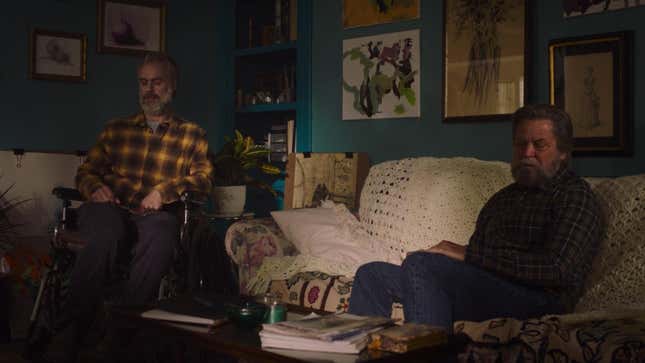
Frank lays out his plans for the day: a trip to the boutique, where he’ll select outfits for the two of them; a wedding ceremony; a final meal, complete with a lethal dose of pills in his wine to send him off to a peaceful and eternal sleep in Bill’s arms. Bill begins to sob, saying he can’t. “Do you love me?” Frank asks. When Bill says that he does, Frank says, “Then love me the way I want you to.”
In the beautiful, wordless sequence that follows, we see shots of the town where these two have lived and loved for 20 years—the hole Frank fell into when he first arrived, little signs of their presence, things they’ve grown and nurtured—and it’s in these shots that I was reminded most of my experience of the game. The game is so much about the environment and the untold stories in it, the weight of absence and history in the places you pass through. There’s no way a TV show can replicate that, but here, briefly, the show does use the environment of Bill’s town to convey the passage of time, the poignancy of this relationship coming to an end as all relationships eventually must, the world they will leave behind.
Then we see the two men get married in the home they’ve shared, on this, Frank’s last day, and it is beautiful, all the more because the world that ended in 2003 for them wouldn’t have allowed them to do so. They are here in the world, for one final day, carving out new possibilities and living free, unfettered by governments or societies that would seek to oppress them.
Finally, at the dinner table, Bill brings Frank his meal, and it’s remarkable how, although for us only 30 minutes have passed, we feel the 20 years that have passed since the first meal these two shared. Bill rotates the plate to present it to Frank properly just like he did back then, all while Nick Offerman’s physicality suggests that Bill is feeling the weight of his years. So much of the power and meaning of this sequence is in things unsaid. It’s in the way Frank looks around the room and smiles, seemingly at peace with the life he and Bill have shared, and the joy and comfort they found in each other.
“You were my purpose”
And then it’s time. Bill brings out an after-dinner bottle of wine, pours the crushed pills into Frank’s glass, and reassures him that the dose will certainly be enough to have the desired effect. He drinks his glass and seals his fate.
Then Bill drinks his own glass with a dramatic finality, all but revealing that he’s chosen to die by Frank’s side. “This isn’t the tragic suicide at the end of the play,” he says. “I’m old. I’m satisfied. And you were my purpose.”
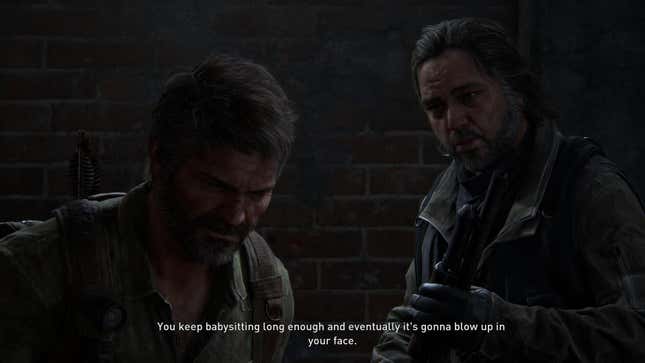
The sentiment of Bill’s story in the show could hardly be more diametrically opposed to that in the game. There, he was an unflinchingly bitter loner, one who’d spent so much time alone that he was prone to talk to himself, and who, in losing Frank, only became more convinced that solitude and isolation were the right ways to live in the post-pandemic world. He goes on a diatribe to Joel about how what he learned from caring about another person is that doing so was a mistake, a liability. His was a perspective that the arc of Joel and Ellie’s story then served to thematically challenge and, ultimately, defeat.
But how much more beautiful is this, a story that acknowledges that, even in the fallen world, love and connection can still endure, sometimes in ways they couldn’t before? It changes the entire thematic arc of the series, using the freedom television offers to break away from central characters for extended periods of time to create a vision of the post-apocalypse in which more than one story of connection is fully realized, reinforcing the idea that, even in such a world, life can still have meaning, because meaning comes from our connections with each other.
One person worth saving
As Joel and Ellie approach the house, the camera lingers on withering flowers that Bill once so mindfully watered, after he came to understand that Frank was right when he said that paying attention to things, taking care of things, is how we show love, and a look on Joel’s face says he knows something’s not right. Ellie finds a note Bill left “to whomever, but probably Joel” that reads, in part,
I never liked you but still, it’s like we’re friends, almost, and I respect you, so I’m gonna tell you something because you’re probably the only person who will understand. I used to hate the world and I was happy when everyone died. But I was wrong, because there was one person worth saving. That’s what I did. I saved him. Then I protected him. That’s why men like you and me are here. We have a job to do. And god help any motherfuckers who stand in our way. I leave you all my weapons and equipment. Use them to keep Tess safe…
I think what Bill learned, in part, is that it’s just as important to have someone to take care of as it is to be a caretaker, that Frank did him a kindness by giving him a purpose larger than himself. Where the Bill of the game only becomes more committed to his rejection of others and the pain they can bring, the Bill of the show learns that it’s only through closeness that life means anything. It’s a bold and wonderful departure from the game that plays to the strengths of TV as a medium and offers viewers just the tiniest gleam of hope that some sort of meaningful life might be made in this fallen world.
Realizing that Bill and Frank’s deaths mean he can’t just hand Ellie off to them like Tess suggested, Joel reluctantly decides, perhaps persuaded in some small way by Bill’s letter, to carry on with her. First, though, he lays out a few rules, mirroring a conversation he has with her in the game. She is not to bring up Tess. She is not to tell anyone about her condition. And she is to do what he says when he says it.
Rummaging for supplies, Ellie finds a red shirt—her signature red shirt from the game—as well as a pistol she sneaks into her backpack, surreptitiously overriding Joel’s constant denials of her requests for a gun. And while the game’s Ellie knows her way around a car, even knowing how to pop a clutch somehow, for our Ellie, hopping into Bill’s truck marks her first proper time in such a vehicle, and she looks around with fascination. “It’s like a spaceship,” she says. “No, it’s like a piece-of-shit Chevy S-10 but it’ll get us there,” Joel replies.
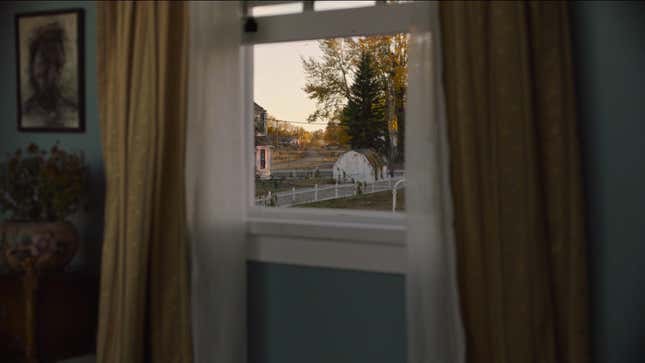
And then, the picture-perfect ending. Rummaging in the glove compartment, Ellie finds a cassette and pops it into the tape deck. Of course, it’s Linda Ronstadt singing “Long, Long Time” and taking us back to that moment, 20 years ago, when Bill and Frank first fell in love. Over the past few days, I’ve repeatedly caught myself singing this heartbreaking song, and I hope that, not unlike the bump Kate Bush got when her amazing song “Running Up That Hill” was featured in Stranger Things, some folks gain new appreciation for Ronstadt’s incredible gifts as a singer.
From a distance, we see Joel and Ellie driving away. The camera pulls back through a window that Bill and Frank have left open in their bedroom. It’s the second shot in the series that nods toward the title screen of the game, the first being an early shot in episode one. A portrait of Bill, painted by Frank, hangs visibly on the wall, a lingering manifestation of the love they shared, as Linda Ronstadt’s voice breaks our hearts.